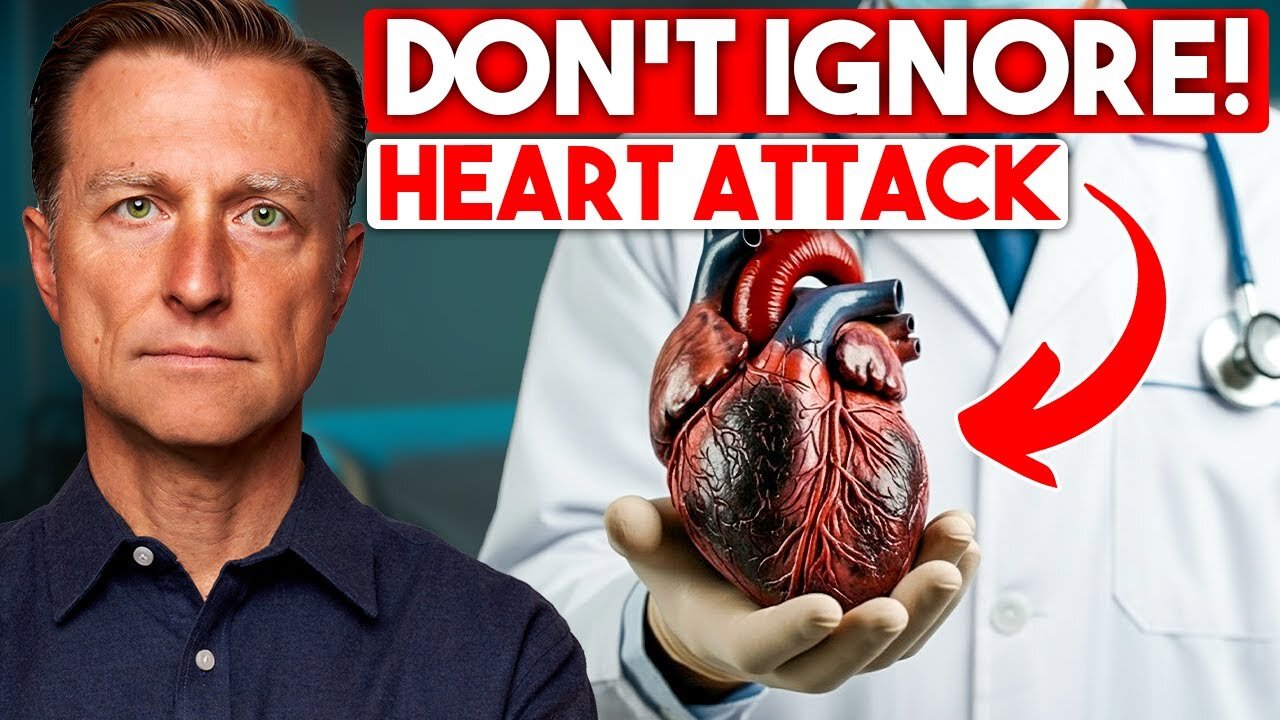Premium Only Content

The MOST Neglected Nutrient By Doctors
Discover the importance of the most neglected nutrient: magnesium! Magnesium can aid in heart attack prevention, support heart health, and improve your overall well-being. Learn more about magnesium deficiency symptoms and why magnesium is vital for cardiovascular health.
0:00 Introduction: Magnesium for heart attack prevention
0:37 Common heart problems
1:40 Magnesium deficiency
2:13 Heart attack prevention medications
5:45 Side effects of a heart attack
6:41 Magnesium and heart attacks
8:00 Magnesium deficiency symptoms
9:04 What causes magnesium deficiency?
DATA:
https://www.ahajournals.org/doi/full/...
Today I want to share some lesser-known heart health tips and how magnesium may help lower heart attack risk.
Common heart problems such as plaquing, blood clots, atrial fibrillation, and hypertension are all related to magnesium deficiency.
Testing for magnesium deficiency is almost impossible because only 1% is in the blood. The majority of magnesium is inside the cells.
Heart medications such as calcium channel blockers, beta-blockers, Warfarin, and medications used to treat high blood pressure work using mechanisms similar to magnesium. Magnesium acts as a natural calcium channel blocker and helps regulate calcium, lower blood pressure, lower adrenaline, and relax the muscles.
People deficient in magnesium often feel tired, especially after exercise. They may also experience migraine headaches. Without enough magnesium, vitamin D cannot work.
Alcohol, refined sugar, starches, genetics, stress, low stomach acid, drugs, and antibiotics can interfere with the absorption of magnesium. Consuming ultra-processed foods increases your demand for magnesium and could cause you to become deficient.
Many sources of magnesium, like spinach, almonds, and chocolate, are high in oxalates. Magnesium glycinate is a great choice for people looking to get more magnesium.
Dr. Eric Berg DC Bio:
Dr. Berg, age 59, is a chiropractor who specializes in Healthy Ketosis & Intermittent Fasting. He is the author of the best-selling book The Healthy Keto Plan, and is the Director of Dr. Berg Nutritionals. He no longer practices, but focuses on health education through social media.
Follow Me On Social Media:
Facebook: https://bit.ly/FB-DrBerg
Instagram: https://bit.ly/IG-DrBerg
Listen to my podcast: https://bit.ly/drberg-podcast
TikTok: https://bit.ly/TikTok-DrBerg
Disclaimer:
Dr. Eric Berg received his Doctor of Chiropractic degree from Palmer College of Chiropractic in 1988. His use of “doctor” or “Dr.” in relation to himself solely refers to that degree. Dr. Berg is a licensed chiropractor in Virginia, California, and Louisiana, but he no longer practices chiropractic in any state and does not see patients, so he can focus on educating people as a full-time activity, yet he maintains an active license. This video is for general informational purposes only. It should not be used to self-diagnose, and it is not a substitute for a medical exam, cure, treatment, diagnosis, prescription, or recommendation. It does not create a doctor-patient relationship between Dr. Berg and you. You should not make any change in your health regimen or diet before first consulting a physician and obtaining a medical exam, diagnosis, and recommendation. Always seek the advice of a physician or other qualified health provider with any questions you may have regarding a medical condition.
#keto #ketodiet #weightloss #ketolifestyle
Thanks for watching! I hope this explains how magnesium can be beneficial for heart attack prevention and your overall health. I’ll see you in the next video.
-
 LIVE
LIVE
Sarah Westall
1 hour agoIs the Fight against China Real? Military Industrial Complex vs China w/ Dr. Rebecca Grant
621 watching -
 1:50:18
1:50:18
vivafrei
5 hours agoInterview with Nick Rekieta, Meghan Murphy! Liberals Go Fingers Up! Democrats Suicidal Empathy! AND MORE! Viva Frei
120K60 -
 54:58
54:58
Candace Show Podcast
4 hours agoWOAH! Shannon Sharpe Names His ‘Jane Doe’ Accuser. Is This The End Of #Metoo? | Candace Ep 180
79.6K57 -
 1:31:11
1:31:11
Redacted News
3 hours agoSomething BIG is happening at Trump's Pentagon and it's not good for peace | Redacted News
83.2K99 -
 LIVE
LIVE
LFA TV
8 hours agoDems Fight Harder for Illegals Than for Citizens | TRUMPET DAILY 4.22.25 7PM
257 watching -
 LIVE
LIVE
RalliedLIVE
4 hours ago $0.92 earnedWarzone Wins All Night w/ Ral
190 watching -
 LIVE
LIVE
Geeks + Gamers
2 hours agoTuesday Night's Main Event
401 watching -
 57:03
57:03
BEK TV
20 hours agoTHE GREAT TAKING: HOW GLOBAL ELITES PLAN TO STRIP YOU OF YOUR PROPERTY SAVINGS
12.8K2 -

SilverFox
18 hours ago🔴LIVE - OBLIVION REMASTERED REVEALED! FIRST IMPRESSIONS!
11.5K2 -
 2:17:01
2:17:01
The Quartering
6 hours agoWoke MELTDOWN As Trump Demands Repayment Of Student Loans, Austin Metcalf Dad Oblivion Greed,
155K104